新概念二第4课
新概念第二册第4课课件
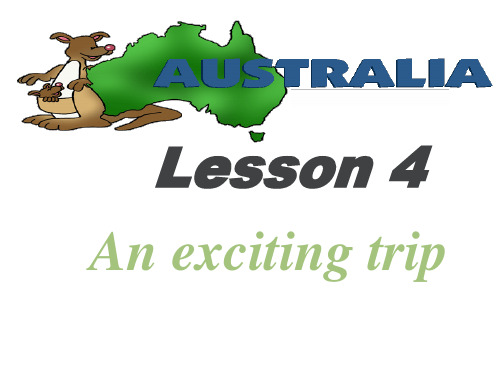
Most backpackers prefer to travel on their own to enjoy his or her solitary life.
You can also travel with your true friends.
Self-driving travel is another good choice.
Oh, no views but crowds in their photos
You must buy something.
You are often forced to buy things while taking group travel. What’s worse, the souvenirs you bought may be the products of poor qualities.
Honeymoon travel
How romantic!
Do careful preparations
Tour route Weather Time plan Map Hotel Possible expenses Cultures security ……
Today we’ll listen to a story about a trip to
Lesson 4
An exciting trip
kangaroo pouch
koala
Group 1 the most common reasons for traveling
Group 3 the different means of transportation in travelling
Let’s go travelling
新概念英语第二册第4课课件(共22张PPT)

课文链接(1)
课文链接(2)
课文链接(3)
课文链接(4)
课文链接(5)
Grammar(语法1):现在完成时
Grammar(语法2) 现在完成时
Summary writing.(摘要写作1)
1)What has the writer just received from his brother , Tim? The writer has just received a letter from his brother, Tim. 2)Is Tim an engineer, or is he a doctor? Tim is an engineer. 3)How long has he been in Australia? He has been in Australia for six months. 4)Has he already visited many places or not? Yes, he has already visited a great number of places. 5)Where is he now? He is in the small town Alice Springs in the centre of Australia. 6)Has Tim ever been abroad before or not ? No, he hasn’t been abroad before. 7)Is he enjoying his trip very much or not? Yes, he is enjoying his trip very much.
Read the text !
I have just received a letter from my brother,Tim. He is in Australia. He has been there for six months. Tim is an engineer. He is working for a big firm and he has already visited a great number of different places in Australia. He has just bought an Australian car and has gone to Alice Springs, a small town in the centre of Australia. He will soon visit Darwin. From there , he will fly to Perth. My brother has never been abroad before, so he is finding this trip very exciting.
新概念英语第二册 Lesson 4 课件
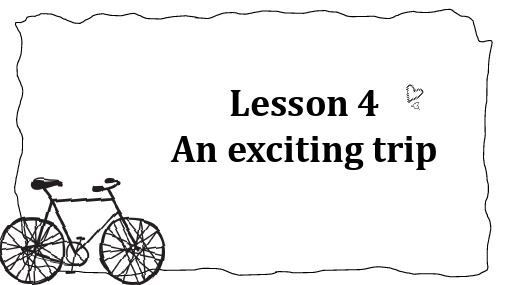
5. centre n. 中心,中央 (美语写作center) shopping centre 购物中心 in the centre of ...在...的中心
e.g. 在北京的中心 in the centre of Beijing
6. abroad adv. 在国外 be abroad 在国外 go abroad 去国外 live abroad 住在国外 (国外定居) travel abroad 在国外旅游 study abroad 国外学习
The doctor has saved over two hundred people’s lives so far. 到目前为止,这位医生已挽救了二百多人的生命。
用for 或since填空。
1. Jill has been in Ireland since Monday. 2. Jill has been in Ireland for three days.
否定句:主语+have/has not+过去分词+其它 He has not been to Australia.
疑问句:Have/Has+主语+过去分词+其它 Has he been to Australia?
三、现在完成时的时间状语
1. 现在完成时与不明确的过去时间状语副词before,just, already,yet,ever等连用。
• I have just received a letter from my brother, Tim. He is in Australia. He has been there for six months. Tim is an engineer. He is working for a big firm and he has already visited a great number of different places in Australia. He has just bought an Australian car and has gone to Alice springs, a small town in the centre of Australia. He will soon visit Darwin. From there, he will fly to Perth. My brother has never been abroad before, so he is fending this trip very exciting.
新概念英语第二册第4课 完整
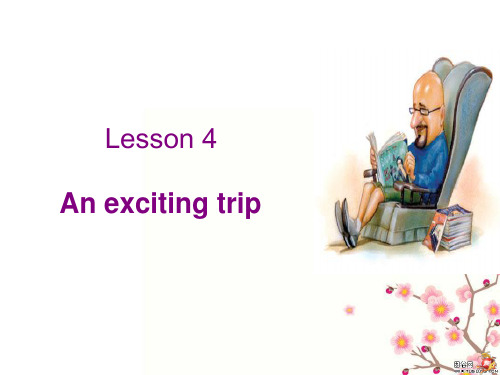
New words
firm n.商行,公司 law firm法律公司 = company公司 different adj.不同的—— same相同的
be different from 与 ……不同
e.g. My coat is different from yours. adv. differently, n. difference
This is an interesting book.
New words
receive v.接受,收到(客观的收到)
This morning I received a bunch of flowers. receive a letter (from sb.)= hear from sb. 我昨天收到Tom的来信。 同义 accept同意,接受(主观) e.g. This morning I received a bunch of flowers but I didn’t accept it.
New words
centre n.中心,中央(美式center) adj. central 中央的,中心的 in the centre of central park, the city centre abroad adv. 在国外 e.g. go abroad, study abroad live abroad, be abroad
Grammar
past now 一般过去时 future
一般过去时表示的是纯粹在过去发生的事情或过去某时 发生的动作 现在完成时表示的是在过去某个时间开始并持续到现在 的动作/状态,或者发生在过去却对现在造成的影响
I saw this film yesterday. (强调看的动作发生过了。) I have seen this film. (强调对现在的影响,电影的内容已经知道了.)
新概念第二册第4课

Lesson 4 An exciting trip一、词汇精选:1.exciting An exciting story an exciting film.excited I feel excited2. receive I receive an letter from my mother 被动收到accept He has just accepted my invitation 主动接受3. work for 为…工作I work for Jim. He works for a big firm.work as 从事…工作he works as an engineer.work in 在…工作My brother works in a factory4. a great number of 大量的(可数) A great number of trees will be planted this year.5. has been in 已经待在某地Joe has been in Guangzhou for three years.has been to 已经去过某地I have been to the Great Wall three times.has gone to 已经到某地去了Jim’s uncle has gone to Austrilia6.in the centre of 在…的中心The park is in the centre of the city.7.fly to 飞往…I am going to fly to Tibet(西藏)soon.8.be abroad 在国外Lily was in abroad last year.study abroad 出国留学I plan to study abroad next month.live abroad 住在国外Do you want to live abroad in the future?9.find + it +形容词觉得…怎么样He finds it interesting.find + them +形容词We find them exciting.find + sth +形容词I find the film boring. They all find your new clothes beautiful.Lily found the trip fantastic.find + doing sth +形容词We all find playing football funny.二、语法1. 现在完成时的时间概念有时是不确定的。
新概念英语第二册第四课答案
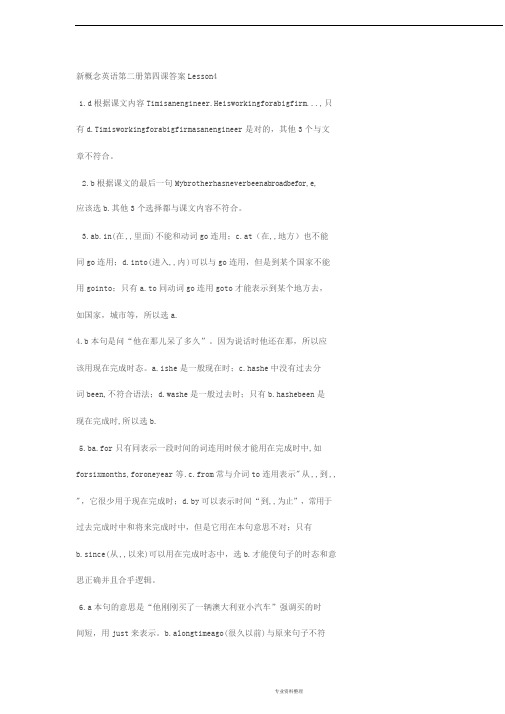
新概念英语第二册第四课答案Lesson41.d根据课文内容Timisanengineer.Heisworkingforabigfirm...,只有d.Timisworkingforabigfirmasanengineer是对的,其他3个与文章不符合。
2.b根据课文的最后一句Mybrotherhasneverbeenabroadbefor,e,应该选b.其他3个选择都与课文内容不符合。
3.ab.in(在,,里面)不能和动词go连用;c.at(在,,地方)也不能同go连用;d.into(进入,,内)可以与go连用,但是到某个国家不能用gointo;只有a.to同动词go连用goto才能表示到某个地方去,如国家,城市等,所以选a.4.b本句是问“他在那儿呆了多久”。
因为说话时他还在那,所以应该用现在完成时态。
a.ishe是一般现在时;c.hashe中没有过去分词been,不符合语法;d.washe是一般过去时;只有b.hashebeen是现在完成时,所以选b.5.ba.for只有同表示一段时间的词连用时候才能用在完成时中,如forsixmonths,foroneyear等.c.from常与介词to连用表示"从,,到,, ",它很少用于现在完成时;d.by可以表示时间“到,,为止”,常用于过去完成时中和将来完成时中,但是它用在本句意思不对;只有b.since(从,,以来)可以用在完成时态中,选b.才能使句子的时态和意思正确并且合乎逻辑。
6.a本句的意思是“他刚刚买了一辆澳大利亚小汽车”强调买的时间短,用just来表示。
b.alongtimeago(很久以前)与原来句子不符合。
styear(去年)也跟原来句子不符合。
d.sixmonthsago(6个月 前)也不对,句子中没有明确说明;只有a .a shor tt im ea (久前,最近)同just 的意思相近,所以应该选a. 7.c 本句需要用现在完成时,已经给出了助动词has,只需要填上过去分词就可以了。
新概念英语第二册第四课课文详解
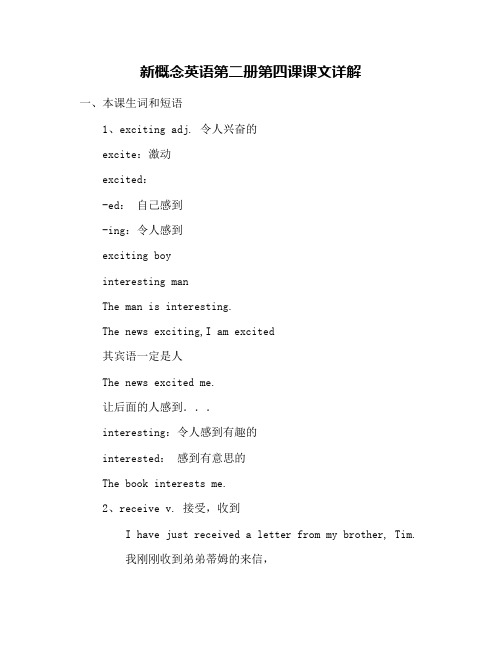
新概念英语第二册第四课课文详解一、本课生词和短语1、exciting adj. 令人兴奋的excite:激动excited:-ed:自己感到-ing:令人感到exciting boyinteresting manThe man is interesting.The news exciting,I am excited其宾语一定是人The news excited me.让后面的人感到...interesting:令人感到有趣的interested:感到有意思的The book interests me.2、receive v. 接受,收到I have just received a letter from my brother, Tim.我刚刚收到弟弟蒂姆的来信,receive[ri5si:v]vt.收到, 接到, 接收(receive的过去式和过去分词是received)re-前缀,表"又,重新"的意思。
Receive/ accept/和take的区别:accept:同意接收receive:客观的收到take take the exam:接收考试; take advice接收建议This morning I received a bunch of flowers from aboy,but I didn't acceptit.take take the exam:接收考试; take advice接收建议receive/havereceive/have a letter from somebody.3、firm n. 商行,公司Companyfirm 主要用在非正式场合和口语,Company 是公司的正式称呼。
4、abroad adv. 在国外副词,直接和动词连用go aroadlive abroadstudy abroad5、so he is finding this trip very exciting.所以,他觉得这次旅行非常激动人心。
新概念英语第二册第四课全课课件

n. 商行,公司
adj. 不同的
centre /'sentə/
abroad /ə'brɔːd/
n. 中心
adv. 在国外
DR
First listen and then answer the question. 听录音,然后回答以下问题。
1. How long has Tim been in Australia? Tim has been in Australia for six months. 2. What does he do in Australia?
常与_______、_____、(only) once、_____或three times等连用,可以 用________________提问,谓语:________v.;
e.g. ① I have already finished my lunch. 我已经吃过午饭了。 ② He has never been late for school. 他上学从未迟到过。
— I have lived here for about ten years. 我在这里住了大约十年了。
DR
21
c. 特别注意:
1. have gone to ( )& have been to( ) e.g. ① It can’t be John. He has gone to town. 那不可能是约翰,他进城了。 ② John knows the way well. He has been to the city before. 约翰很熟悉那里的路。他以前去过那个城市。
3. Why is Tim finding the trip exciting?
DR
新概念英语第二册Lesson4课件
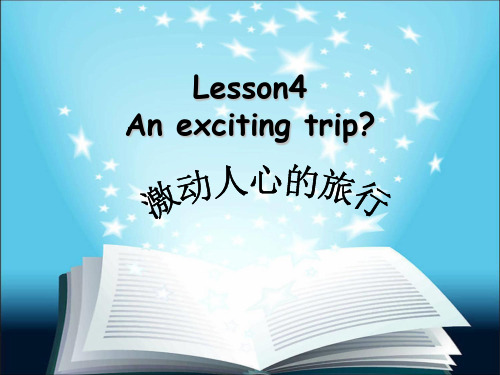
New words
firm n.商行,公司 law firm法律公司
公司
=company
different adj.不同的—— same相同的
adv. differently, n. difference
e.g. My coat is different from yours.
和…相同,一样
be the same with/as
--他们已经离开了,也就是说现在他们人不在这里
I have had my lunch.
--我已经吃过午饭了,也就是说我现在不饿
也可表示持续到现在的动作或状态。
He has learned English since 2001.
现在完成时与一般过去时的比较
1)一般过去时表示过去某时发生的动作或 单纯叙述过去的事情,强调动作;
yesterday.
6. There ___w_a__s(be) a telephone call for you just now. 7. When _d_i_d___ you _c_o__m__e(come) to China?
----Last year.
8. Yesterday I _t_h_o_u__g_h__t (think) that you were not in
现在完成时为过去发生的,强调过去的 事情对现在的影响,强调的是影响。
I saw this film yesterday. (强调看的动作发生过了。) I have seen this film. (强调对现在的影响,电影的内容已经知道 了。)
Grammar
2一般过去时常与具体的表示过去的时间状语连用; 现在完成时通常与模糊时间状语连用或无时间状语。
新概念英语第二册课后练习答案lesson4
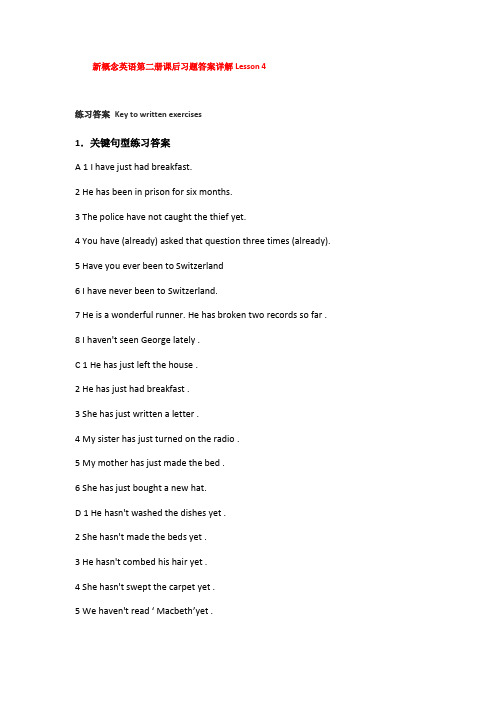
新概念英语第二册课后习题答案详解Lesson 4练习答案Key to written exercises1.关键句型练习答案A 1 I have just had breakfast.2 He has been in prison for six months.3 The police have not caught the thief yet.4 You have (already) asked that question three times (already).5 Have you ever been to Switzerland6 I have never been to Switzerland.7 He is a wonderful runner. He has broken two records so far .8 I haven't seen George lately .C 1 He has just left the house .2 He has just had breakfast .3 She has just written a letter .4 My sister has just turned on the radio .5 My mother has just made the bed .6 She has just bought a new hat.D 1 He hasn't washed the dishes yet .2 She hasn't made the beds yet .3 He hasn't combed his hair yet .4 She hasn't swept the carpet yet .5 W e haven't read ‘ Macbeth’yet .E 1 Have you seen the new play at ‘The Globe’yet2 Have you taken your holidays yet3 Have you read this book yet4 Have you done your homework yet5 Have you finished your work yet2 .难点练习答案1 received2 received3 took4 taken5 take3.多项选择题答案1. d根据课文内容Tim is an engineer. He is working for a big firm..., 只有d. Timis working for a big firm as an engineer 是对的,其他3个与文章不符合。
新概念英语2第四课原文
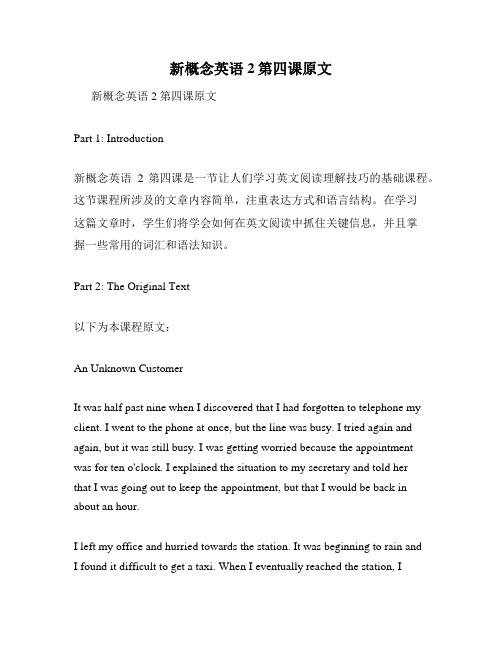
新概念英语2第四课原文新概念英语2第四课原文Part 1: Introduction新概念英语2第四课是一节让人们学习英文阅读理解技巧的基础课程。
这节课程所涉及的文章内容简单,注重表达方式和语言结构。
在学习这篇文章时,学生们将学会如何在英文阅读中抓住关键信息,并且掌握一些常用的词汇和语法知识。
Part 2: The Original Text以下为本课程原文:An Unknown CustomerIt was half past nine when I discovered that I had forgotten to telephone my client. I went to the phone at once, but the line was busy. I tried again and again, but it was still busy. I was getting worried because the appointment was for ten o'clock. I explained the situation to my secretary and told herthat I was going out to keep the appointment, but that I would be back in about an hour.I left my office and hurried towards the station. It was beginning to rain andI found it difficult to get a taxi. When I eventually reached the station, Ifound that the trains were not running because of a strike. I did not know what to do. If I went back to my office, it would take at least half an hour. If I walked to my client's office, I would be wet through when I got there. As there was nothing else to do, I decided to take the subway.When I got out of the subway, I realized that I did not know the way to my client's office. I had only been there once before and that was a year ago. I looked for a taxi, but there was not one in sight. I had no alternative but to walk. I was not at all sure in which direction to go, but I remembered that there was a large church near my client's office. After walking for about twenty minutes, I saw the church in the distance.I was walking quickly, but I suddenly stopped. I had left my umbrella in the subway! I hesitated for a moment and then decided to go back for it. I knew that it would not take long, and I thought that it would be foolish to get wet through if I did not have to. When I got back to the subway, I found that the umbrella had gone. I went to the lost property office and described my umbrella. The man looked in his book and then disappeared into the back of the office. He returned with a large umbrella which he handed to me. It was twice the size of mine.I left the subway again and set off in the direction of the church. I had not gone very far when the rain stopped, and the sun came out. It was a beautiful day. When I arrived at my client's office, I apologized for being late, but he told me not to worry. 'I've only just arrived myself,' he said. 'I was held up by a phone call.'Part 3: Analysis and Discussion这篇原文讲述了一个人迟到的故事。
新概念英语第二册第4课习题答案
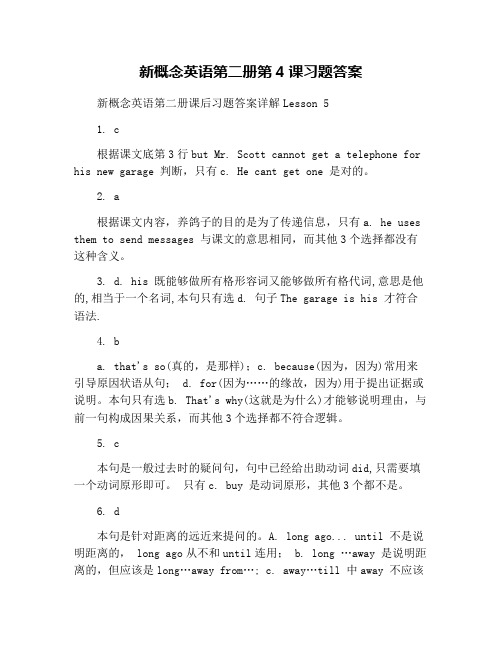
新概念英语第二册第4课习题答案新概念英语第二册课后习题答案详解Lesson 51. c根据课文底第3行but Mr. Scott cannot get a telephone for his new garage 判断,只有c. He cant get one 是对的。
2. a根据课文内容,养鸽子的目的是为了传递信息,只有a. he uses them to send messages 与课文的意思相同,而其他3个选择都没有这种含义。
3. d. his 既能够做所有格形容词又能够做所有格代词,意思是他的,相当于一个名词,本句只有选d. 句子The garage is his 才符合语法.4. ba. that's so(真的,是那样);c. because(因为,因为)常用来引导原因状语从句; d. for(因为……的缘故,因为)用于提出证据或说明。
本句只有选b. That's why(这就是为什么)才能够说明理由,与前一句构成因果关系,而其他3个选择都不符合逻辑。
5. c本句是一般过去时的疑问句,句中已经给出助动词did,只需要填一个动词原形即可。
只有c. buy 是动词原形,其他3个都不是。
6. d本句是针对距离的远近来提问的。
A. long ago... until 不是说明距离的, long ago从不和until连用;b. long …away 是说明距离的,但应该是long…away from…; c. away…till 中away 不应该和till 连用,不符合习惯用法,从意义上讲不通;只有d. far…from (离……远)是说明距离远近的,符合英语中惯用法,所以选d.7. a本句需要选一个介词用在three minutes 之前,表示所用的时间。
只有a. in合适,而其他3个选择都不能和three minutes 构成表示时间的短语,所以选a.8. b本句需要选表示“另一个”意思的词修饰garage.a. another(adj.) 有另一个的含义,但它前面不能带其他的修饰词,如冠词,所有格形容词等;c. else(adj.其他的,别的,另外)做形容词时应该放在它所修饰的词和代词之后;d. different(adj.不同的)与题目意思不符合;只有b. other(另外的,其他的)能够带其他的修饰成分,如the, his 等,也能够用在名词前面,所以选b.9. c本句需要选出一个与前一句中的动词get 意思相同的词.a.take(拿去,携带)b. receive(收到),d. find(发现,找到)都不是get的同义词.,只有c. obtain(获得),所以选c.10. b本句需要选出与前一句的动词短语send requests for 的意思相同的词或短语.a. asked(问,打听); b. asked for(请求),c.begged(乞讨),d. pleased(喜欢,使……高兴),只有 b.有请求的意思,意思最接近,所以选b.11. a本句主要想说明紧急信函应如何发出。
《新概念英语》第二册第4课

Lesson four1: I have just received a letter from my brother, Tim.1) receive vt.接到,收到,得到When did you receive that letter?Susan received a gift/card this morning.receive 是被动的动作,主观上接受不接受并不清楚,take是主动地“拿,取”He told me to take the keys from his pocket.I received a beautiful pen from my uncle. My brother took itfrom me yesterday.accept:接受I can’t accept your offer of help.Lucy accepted him into his family as a son.He won’t accept her as his pupil.Marx was warmly accepted there.2)receive a letter from=hear from sb=get a letter from sb2:He is in Australia. He has been there for six months.1)Australia----Australian China---ChineseThe U.K.---the British the U.S.A.—AmericanFrance----French Japan----JapaneseGreece---Greek Germany---GermanItaly -----Italian Singapore—SingaporeanIndia----Indian Egypt---Egyptian Ireland—IrishAustria---Austrian Brazil---Brazilian Korea—KoreanBrazil---Brazilian Belgium---Belgian Canada--CanadianNew Zealand---the people of New Zealand2)现在完成时:现在完成时由“have/has+过去分词”构成,主要有两个含义:①表示动作发生在过去,对现在有影响,有时无时间状语,有时和一些表示不确定的过去时间状语连用,如:many times,just,yet,ever,never,already,before,so far, by now等连用。
(完整版)新概念英语第二册lesson-4(含课文、练习)
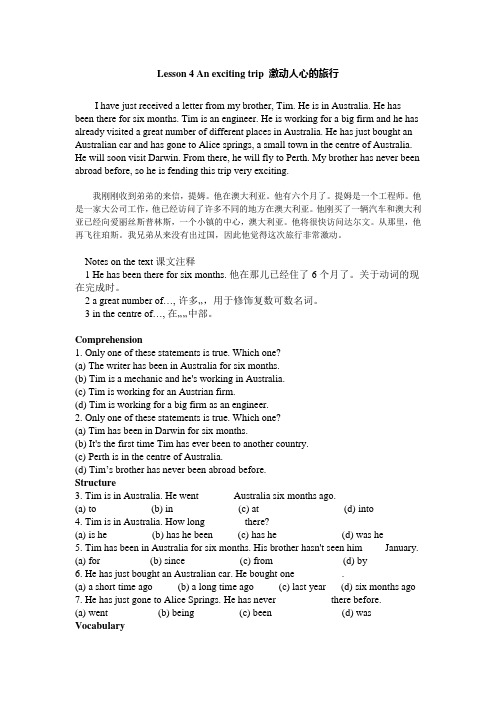
Lesson 4 An exciting trip 激动人心的旅行I have just received a letter from my brother, Tim. He is in Australia. He has been there for six months. Tim is an engineer. He is working for a big firm and he has already visited a great number of different places in Australia. He has just bought an Australian car and has gone to Alice springs, a small town in the centre of Australia. He will soon visit Darwin. From there, he will fly to Perth. My brother has never been abroad before, so he is fending this trip very exciting.我刚刚收到弟弟的来信,提姆。
他在澳大利亚。
他有六个月了。
提姆是一个工程师。
他是一家大公司工作,他已经访问了许多不同的地方在澳大利亚。
他刚买了一辆汽车和澳大利亚已经向爱丽丝斯普林斯,一个小镇的中心,澳大利亚。
他将很快访问达尔文。
从那里,他再飞往珀斯。
我兄弟从来没有出过国,因此他觉得这次旅行非常激动。
Notes on the text 课文注释1 He has been there for six months. 他在那儿已经住了6个月了。
关于动词的现在完成时。
2 a great number of…, 许多…,用于修饰复数可数名词。
3 in the centre of…, 在……中部。
新概念英语第二册课后练习答案lesson4
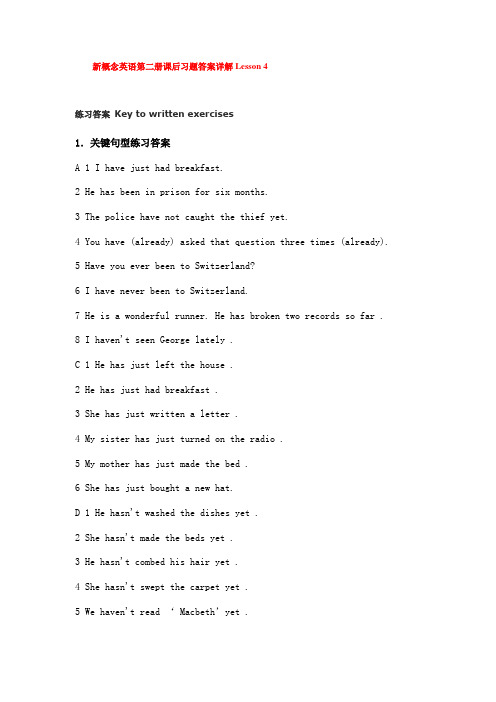
新概念英语第二册课后习题答案详解Lesson 4练习答案Key to written exercises1.关键句型练习答案A 1 I have just had breakfast.2 He has been in prison for six months.3 The police have not caught the thief yet.4 You have (already) asked that question three times (already).5 Have you ever been to Switzerland?6 I have never been to Switzerland.7 He is a wonderful runner. He has broken two records so far .8 I haven't seen George lately .C 1 He has just left the house .2 He has just had breakfast .3 She has just written a letter .4 My sister has just turned on the radio .5 My mother has just made the bed .6 She has just bought a new hat.D 1 He hasn't washed the dishes yet .2 She hasn't made the beds yet .3 He hasn't combed his hair yet .4 She hasn't swept the carpet yet .5 We haven't read ‘ Macbeth’yet .E 1 Have you seen the new play at ‘The Globe’yet ?2 Have you taken your holidays yet ?3 Have you read this book yet ?4 Have you done your homework yet ?5 Have you finished your work yet ?2 .难点练习答案1 received2 received3 took4 taken5 take3.多项选择题答案1. d根据课文内容Tim is an engineer. He is working for a big firm..., 只有d. Timis working for a big firm as an engineer 是对的,其他3个与文章不符合。
- 1、下载文档前请自行甄别文档内容的完整性,平台不提供额外的编辑、内容补充、找答案等附加服务。
- 2、"仅部分预览"的文档,不可在线预览部分如存在完整性等问题,可反馈申请退款(可完整预览的文档不适用该条件!)。
- 3、如文档侵犯您的权益,请联系客服反馈,我们会尽快为您处理(人工客服工作时间:9:00-18:30)。
以ant/ent结尾的为adj. 以ance/ence结尾的为n. important 重要的 importance 重要性 patient 耐心的 patience 耐心 distant 遥远的 distance 距离
centre (美 center ) n.中心 shopping center 购物中心 training center 培训中心 service center 服务中心 That girl likes to be the center of attention. 那个女孩想成为焦点。 Beijing is the center of politics,economics and culture of China.北京是中国的政治、经济和文化中心。 I have been looking for you left,right and center. Where have you been? 我到处找你,你去哪儿了?
• He is in Australia.He has been there for six months. 他 正在澳大利亚。他在那儿已经住了6个月了。 • Australia 澳大利亚 Australian 澳大利亚的 • has been + 地点 + for + 时间 在某地多长时间 • He has been in Beijing for one year.他已经在北京一年 了。 • He has been in America for tow years.他已经在美国 呆了两年了。 • I have arrived in Beijing. 我已经到北京了。 • arrive 是瞬间动词不能和段时间连用
★receive • ① vt. 接到,收到,得到 • receive sth from sb 从某人那儿收到某物 • When did you receive that letter?你什么时候收到的 那封信? • ② vt. 招待,接待 • You need a large room if you are going to receive so many guests.如果你要招待这么多客人的话,你需要 一个大房间。 • receive是“收到”,指的是一个客观的动作 • accept 主观上同意接收 • This morning I received a bunch of flowers from a boy, but I didn't accept it.今天早上我收到了一个男孩送给 我的一束花,但是我并没有接受。
• He has just bought an Australian car and has gone to Alice springs, a small town in the centre of Australia.他刚买了一辆澳大利亚小汽车,现 在去了澳大利亚中部的小镇艾利斯斯普林斯。 • have gone to 去了某地没回来 • have been to曾经去过某地, 现在不在那个地方 • Have you been to Paris?你去过巴黎吗? • Lucy has gone to the library. Lucy去了图书馆。
பைடு நூலகம்
• 这个兴奋的女孩渴望着和他的白马王子的第一次激 动人心的约会。 • 一般来说,带-ed 的词表示人的感受,带-ing 的词表 示物的性质和状态。
surprising 令人惊喜的 surprised 感到惊喜的 interesting令人感兴趣的 interested感到感兴趣的 shocking令人震惊的 shocked 感到震惊的 satisfying令人满意的 satisfied 感到满意的 disappointing令人失望的 disappointed感到失望的 touching 令人感动的 touched 感到感动的
★different adj. 不同的 (反:same)
A is different from B. A和B是不同的 • We are planning something different this year. • 我们今年有不同的打算。 • My room is different from yours.我的房间与你的不同。 • Everyone is different from others.每个人都和别人不 同的。 • difference n.区别,差别 • tell the difference between A and B 辨认A和B的区别 • We can easily tell the difference between the twins. • 我们很容易辨认双胞胎的区别。
★exciting adj. 令人兴奋的(主语是物或事)
• • • • • • The news is really exciting.这个消息真让人兴奋。 excited adj.感到兴奋的(主语是人) I am excited.我感到很兴奋。 excite v. 激动 ,令…兴奋 The news excites me.这个消息让我激动。 The excited girl is looking forward to her exciting first date with her Mr.Right.
★abroad adv. 在国外(副词, 直接和动词连用) • go abroad去国外 be abroad 在国外 • live abroad 在国外居住 • study abroad去国外学习 • I would like to go abroad this year, perhaps to the South of France.今年我想去国外,有可能 去法国南部。 • A great number of outstanding young Chinese want to study abroad.许多杰出的年轻中国人 想出国留学。
• He will soon visit Darwin. From there, he will fly to Perth.他不久还将到达达尔文去,从那里,他再飞往 珀斯。 • soon: 很快(时间) • He will come soon.他马上就来. • See you soon!一会见! • from 既可以加时间又可以加地点 • I was there from half past 8 to half past 11.我从8点半 到11点半在那。 • How far is it from here to the station?从这里到火车站 多远? • fly to Perth=go to Perth by air • fly – flew – flown
Lesson 4
An exciting trip 激动人心的旅行
• • • • • •
exciting receive firm different centre abroad
[ɪkˈsatɪŋ] ɪ adj. 令人兴奋的 [rɪ'si:v] v. 接受,收到 [fɜ:m] n. 商行,公司 [ˈdfrənt] ɪ adj. 不同的 [ˈsent ə(r)] n. 中心 [əˈbr ɔ:d] adv. 在国外
firm 1) n.(尤作口语)公司 He is working for a big firm.他在一家大公司工作。 company (更口语化)公司 corporation 公司,法人,团体 enterprise 事业单位,企业,公司 group 集团公司 2) adj.牢固的,稳固的,坚实的 Prices are still firm.物价仍旧很稳定。 as firm as rock 坚如磐石 a firm foundation 坚实的基础 3)adj.坚定的,坚决的 His reply to the request was a firm “No”! 他坚决地拒绝了这个要求。
• I have just received a letter from my brother, Tim. He is in Australia. He has been there for six months. Tim is an engineer. He is working for a big firm and he has already visited a great number of different places in Australia. He has just bought an Australian car and has gone to Alice springs, a small town in the centre of Australia. He will soon visit Darwin. From there, he will fly to Perth. My brother has never been abroad before, so he is finding this trip very exciting.
• My brother has never been abroad before, so he is finding this trip very exciting. 我弟弟以前从未出过国, 因此,他觉得这次旅行非常激动人心。 • find作“发现”、“发觉”讲时宾语往往带补足语 (一般为形容词),说明宾语的状况、性质等。 • find +宾语+形容词做宾补 • When I returned home, I found the room clean.当我回 到家的时候,我发现房间很干净。 • She found her baby still asleep.她发现婴儿还在睡. • I find English difficult but interesting.我发现英语很难 但很有趣。
• • • • • •
exciting receive firm different centre abroad
